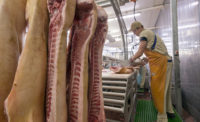Sam Gazdziak spoke with Gary Smith of Texas A&M about a new program at the university, a Master’s of Agriculture in the Meat Industry.
Sam Gazdziak: Dr. Smith, can you talk about what led you to get this program started?
Gary Smith: I had just rejoined Texas A&M University after spending 25 years at Colorado State University. When I got here, my boss said, “Is there any possibility you’d be interested in trying to develop a program, Master’s of Agriculture.” [This program is] something they do after they get their [Bachelor of Science (BS)] degree, or maybe there is somebody in a company that would like to rise up the corporate ladder, but they really don’t understand the basics. When I was growing up, the people who managed most of the big meat packing plants started on the floor and ultimately worked their way to the top. What we are trying to do is develop a program that can accelerate the rate at which people go up the corporate ladder. So I used my own experience. What happened to me in my lifetime was I was hired as an instructor, and during the time I was an instructor, I spent four consecutive summers doing internships. I was teaching at Washington State University, but each summer I did a different thing. I spent the first summer with the Meat and Poultry Inspection Program learning meat inspection. I spent the second summer at Armour & Company, a big packing plant in Spokane, Washington… six stories, wonderful internship. I was there 16 weeks. I worked in 16 different parts of the plant. I had lunch every Wednesday with someone who was in charge of one of the sections in the plant, so I got exposed to leaders. The manager of the plant, Bud Wells, took me to dinner every Tuesday night, and we talked about what the guys at the top of these companies do. Then, I spent the third summer at a IGA (Independent Grocers Association) cutting distribution center, where I learned to cut out, how they changed and what they were doing in retail stores. I had a wonderful experience with those things. The last summer I spent as a relief meat cutter in three different supermarket chains in three different states. So I was trying to recreate in this program what had helped me so much as I spent my life teaching meat science. So that’s what we’re trying to do. We’re trying to put together that combination of being exposed to leaders, people that came up the hard way, and I don’t care if they ever went to college or not. I want to know how did they go from the sixth floor to the first floor and then over to the office building. What is it that these young people need to know? How will they actually achieve that? So what the program is designed to do is take a person who has a pretty good knowledge, because they’ve gone through college, in meat science, but now let’s give them management, marketing and communications. Let’s expose them to these leaders, these people who are doing so well in companies: small-, medium- and large-sized companies. Then, I want them to have internships, but I want to be real careful about those internships, because I don’t just want them out there working somewhere with the same job all summer. I want internships where they will see various facets of the company, where they will have the opportunity to sit down with people in management and understand what it is those people do, what do they need to improve in order to be really capable and to excel at this career and then get some special course work in things that are not ordinarily in the programs that you go through for meat science, like marketing, economics, ag economics, business, accounting, management and so on. How do you manage things, or how do you communicate, from the lowest to the highest person in your plant, and how do you communicate with people outside, like your suppliers and so on. So it’s a 15-month program. We’re hoping that most people will graduate with their BS, go immediately to an internship for three months, come on campus and spend two semesters to take that coursework. During that period of time, we’re going to get them exposed to as many people as we can, taking them out to plants so they can visit with people, asking people from those plants to the university to sit down and talk with the students, and hopefully, at the end of those 15 months, they’ll be ready to go. And I still think they have to start somewhere where they have to work. They’ve got to understand operations. Whether it’s a harvesting plant or a processing plant or whatever it is, you’ve got to start down at the bottom, but hopefully what this will do is speed the rate at which they will become competent enough to rise within the company.
Gazdziak: Now that you’ve got the program up and you have the basics of that launched, what is the help you can get from the meat industry? What can leaders do to help you now?
Smith: What I did at this particular meeting was I asked my friends from other universities to send me some prospective students’ resumes. We want to find some really dedicated people, who want to do this as their life’s vocation, so I need those. Then, the people in this room, whether they are small plants, large plants, medium-sized plants, great leaders here in the Meat Association here in the southwest, but I want them to create internships that will really give them ultimate opportunities to interact with people in their companies who are in charge of specific parts of it to tell them what it takes to really go up through the management level. So I want students from the universities, and from the companies, I want to establish internships to help me identify students who want guidance and counsel from the leaders. I actually wanted to start this program largely because I think there are people in lots of companies that really have the capability to move up but just are not well-grounded in what it is they work in. They may not know a whole bunch about some little area, but I hope there are companies that say, “Here is a person who can somebody run this company, I want to give them 15 months, and we will be able to pay them for those 15 months, it’s not much but it will keep them alive for that year. We want them to send young people from their companies to spend 15 months with us and see if we can get them shaped up, honed in and ready to go.
Gazdziak: Best of luck with the program. Thank you so much for your time.



Report Abusive Comment